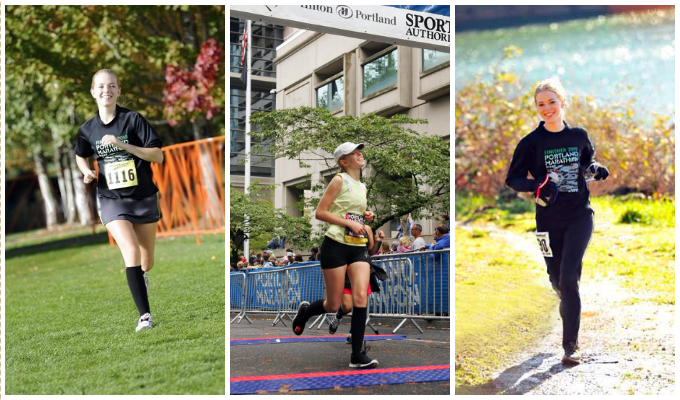Good health is as much about fitness as it is about food.
Last year, I really focused on getting healthier through food, mainly by cooking more at home. This, by default, led me to eat more whole, healthy foods – and I definitely felt the effects of it. When I compare how I felt throughout the last year to how I felt in the year prior, it was really obvious that that one simple change I made – a small effort to cook something every day – really had a massive impact. I had more energy, felt happier and less depressed, and got sick WAY less. (Like maybe once? The year before I was catching a cold like clockwork almost every month!)
I’m still cooking every day, and I’m still making it a point to eat healthfully. Hopefully, I always will! But this year, I’m shifting my focus back to my physical fitness.
I’ve had an interesting relationship with fitness and exercise over the years. I never did any sports growing up and I used to consider myself the least athletic person I knew. Then, when I was 23, completely out of nowhere, I decided that I was going to run a marathon. And somehow, despite all odds, I did. (I wrote a little bit about it in this post.) That experience totally changed my perception of myself. It made me realize that I was only ever going to be as fit and as strong as I allowed myself to be. It showed me that my limits are mainly in my own mind. And it also opened the door to my making exercise (and physical challenges in general) a more regular part of my life.
 Although… I have to say, I’ve always struggled with that “regular” part. I’ve found that I tend to have an “all or nothing” mindset towards exercise. I’m either really disciplined for months on end, hitting the gym almost every day, or else I don’t go at all – also for months on end. I’ve finished 7 marathon-distance (or more!) races in 2 years but then really struggled hard to get back into the next couple before I ditched running altogether. I tend to go “all in” on either running OR weightlifting OR yoga, while mostly neglecting any other type of exercise. And that’s what I’d like to change.
Although… I have to say, I’ve always struggled with that “regular” part. I’ve found that I tend to have an “all or nothing” mindset towards exercise. I’m either really disciplined for months on end, hitting the gym almost every day, or else I don’t go at all – also for months on end. I’ve finished 7 marathon-distance (or more!) races in 2 years but then really struggled hard to get back into the next couple before I ditched running altogether. I tend to go “all in” on either running OR weightlifting OR yoga, while mostly neglecting any other type of exercise. And that’s what I’d like to change.
Because fitness isn’t all or nothing. Just like with food and nutrition, every little bit helps – and the more variety the better.
My biggest breakthrough has been loosening up my definition of exercise and making a point to not only move more, but in as many different ways as possible. It’s not rocket science. Different types of exercise stress and strengthen your body in different ways. If you stick with just one, you’re much more likely to get injured or burned out. If you switch it up, your whole body will get stronger, fitter, and more flexible.
I made similar resolutions this year – to just do a little bit every day. And yet I’m not even three weeks in, and already I’ve logged as much time practicing yoga as I did in the whole of last year. At this rate, by the end of January, I’ll have put in more time exercising than in all of 2016. And already it’s paying off big time.
We all know that exercise is good for you. And we (hopefully) all know that regular exercise improves cardiovascular health, speeds up your metabolism, increases muscle mass and bone density, and aids in fat loss. But there are countless other benefits as well. So whether or not you already have an established fitness routine, here are 10 somewhat surprising benefits of exercise to give you that extra bit of motivation to get out there and break a sweat.
1. Physical fitness is linked to improved academic performance, cognitive function, and language skills.
Exercise actually alters brain structure, improves various types of brain functions, and leads to better cognitive performance in a variety of different areas. Physically fit children process information more quickly and have better language skills. Studies have also shown that exercise can enhance and facilitate learning and improve academic performance. http://www.sciencedirect.com/science/article/pii/S0278262614000608
2. Exercise increases the diversity of gut microbiota.
Lots of exciting new research has been coming out recently showing how the types and overall diversity of the microflora of the gut affects various components of a person’s health. A low diversity of gut microbes has been linked to obesity and other health problems. Greater diversity, on the other hand, has been associated with stronger metabolic and immune system responses. http://gut.bmj.com/content/63/12/1913
3. Exercise can prevent and relieve stress-induced depression.
It does this by causing changes to occur in within the muscles that lead to the production of an enzyme that gets rids of harmful substances within the body, particularly those that accumulate during stress and are harmful to the brain. http://www.alphagalileo.org/ViewItem.aspx?ItemId=145612&CultureCode=en
4. Even a single exercise session may improve the body’s reaction to oxidative stress.
At least in younger adults, “just one exercise session may improve the body’s ability to overcome stressors by potentially boosting the antioxidant system… Improving the body’s reaction to oxidative stress could lower the risk for many chronic diseases.” http://www.sciencedaily.com/releases/2014/12/141216211811.htm
5. Exercise can actually decrease fatigue and make you feel less tired.
Just because you expend energy while exercising doesn’t mean it has to tire you out. Low and moderate levels of exercise significantly improved feelings of energy in sedentary adults with persistent fatigue. http://www.ncbi.nlm.nih.gov/pubmed/18277063
6. Exercise can successfully treat depression.
Studies have shown that exercise can be just as effective as psychotherapy and antidepressant medications in treating clinical depression, and in many cases, the effects are longer lasting than alternative therapies. http://www.ncbi.nlm.nih.gov/pmc/articles/PMC474733/
7. Exercise is strongly linked to mental health.
Regular exercise can increase feelings of self-efficacy, reduce anxiety, and boost your mood, making you feel happier as well as healthier. The great thing is that many of these mental benefits are noticeable more immediately than the physical benefits. http://www.apa.org/monitor/2011/12/exercise.aspx
8. Exercise improves memory and reduces the risk of dementia.
Regular exercise may slow or reverse the shrinking of the hippocampus that occurs with age. As a result, physical activity can be critical in preventing dementia and age-related memory loss. http://www.ncbi.nlm.nih.gov/pubmed/21282661
9. Exercise may prevent or delay the fundamental process of aging.
Research has finally shown that exercise can prevent or delay the process of cell death, or senescence, and associated inflammation. In this way, exercise can help counteract other unhealthy lifestyle choices (not that you should be in the habit of making them) and slow the aging process. http://www.newswise.com/articles/road-to-the-fountain-of-youth-paved-with-fast-food-and-sneakers
10. Lack of exercise is responsible for twice as many early deaths as obesity.
A study of more than 334,000 men and women found that twice as many deaths can be attributed to lack of physical activity than to obesity. The good news is that even a small increase in physical activity, such a brisk 20 minute daily walk, could reduce a person’s risk of early death by as much as 30% and could lead to other significant health benefits. http://ajcn.nutrition.org/content/early/2015/01/14/ajcn.114.100065

Committing to regular exercise doesn’t mean you need to be chained to the treadmill for an hour or sweat your way through a heart-pounding class at the gym. Many of the above benefits can be gained by simply engaging in light to moderate-intensity physical activity on a regular basis. That can be as little as taking a walk around the neighborhood after dinner, signing up for a dance class, following along with a yoga video on YouTube, or challenging yourself to do some squats and pushups each day.
Find what works for you, and make it fun. Fitness doesn’t have to be all-or-nothing, and it certainly doesn’t need to be complicated.
Just get moving, get healthy, and get happy. ‘Nuff said.

